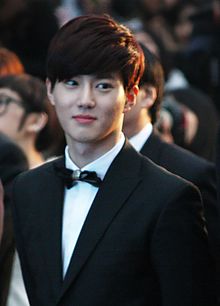Exo-K
Suho, Baekhyun, Chanyeol, D.O. Kai, Sehun

Kim Jong In (Kai)
Born January 14, 1994
A South Korean singer, dancer and actor. He is a member of the South Korean-Chinese boy group EXO and its sub unit EXO-K.He developed his current technical expertise of hip hop, popping and locking after joining S.M. Entertainment.
Kai was the first of twelve Exo members to be formally introduced to the public through teaser trailers
In 2008, Kai made a brief appearance in TVXQ's music video, "HaHaHa Song" along with EXO members Suho and Chanyeol.
 Kim Jun-myeon (Suho)
Kim Jun-myeon (Suho)Born May 22, 1991
A South Korean singer and actor. He is a member and the leader of the South Korean boy group EXO and its sub-unit EXO-K. Suho joined S.M. Entertainment's Casting System in 2006 when he was 16 years old, after he was discovered on the streets by a S.M. casting manager.
At 16 years old, Suho became the first EXO member to be cast as a trainee by SM Entertainment. On February 15, 2012, he was officially introduced as the tenth member of EXO.
 Park Chan-yeol
Park Chan-yeol
Born November 27, 1992
A South Korean singer and actor and a member of the South-Korean- Chinese boy group EXO and its sub-group EXO-K. Chanyeol was accepted into S.M. Entertainment in his first year of high school after winning second place in the 2008 Smart Model Contest.
Chanyeol was the last member of EXO to be formally introduced to the public, on February 23, 2012.
Sehun made a brief appearance in Girls' Generation-TTS's music video for "Twinkle" alongside fellow members Baekhyun, Chanyeol, and Kai in 2012.

 Oh Sehun (Sehun)
Oh Sehun (Sehun)Born April 12, 1994
A South Korean K-pop star and dancer. He is the youngest member and one of the main dancers of the South Korean-Chinese boy group EXO and its sub-group EXO-K. He was introduced as the fifth member of EXO on January 10, 2012.
He graduated high school from School of Performing Arts Seoul in February 2013. All 11 other EXO members attended his graduation. He has a brother three years older than him.
Sehun was first scouted by an S.M. casting agent at 12 years old while he was out having lunch (tteokbokki) with his friends. While at first running away from the agent for 30 minutes and being chased in the streets, he was eventually cast into S.M. Entertainment in 2008. He went through four auditions in two years. On January 10, 2012, Sehun was officially introduced as the fifth member of EXO.
 Do Kyung-soo (D.O)
Do Kyung-soo (D.O)Born January 12, 1993
A South Korean singer and actor and is a member and one of the main vocalists of the South Korean-Chinese boy group EXO and its sub-group EXO-K. In 2010, he was recommended to audition for S.M. Entertainment after winning a local singing festival.
D.O. was formally introduced as the eighth member of EXO on January 30, 2012. He has been actively participating in EXO since then.
 Byun Baek-hyun (Baekhyun)
Byun Baek-hyun (Baekhyun)Born May 6, 1992
A South Korean singer and actorand a member of SM Entertainment's South Korean-Chinese boy group EXO and its sub-unit EXO-K. He attended Jungwon High School in Bucheon, where he was the lead singer in a band called 혼수상태 (Coma) and won a local music festival.
Baekhyun was the last member to join EXO and was officially revealed as the group's ninth member on January 30, 2012.
On June 19, 2014, S.M. Entertainment confirmed that Baekhyun and fellow S.M artist Girls Generation member Taeyeon were in a relationship. In September 2015, their relationship was rumoured to have ended. S.M. Entertainment has yet to respond to these rumours.
Exo-M
Kris Xiumin, Luhan, Lay, Chen, Tao
Born November 6, 1990
A Canadian-Chinese actor and singer-songwriter currently active in China. He immigrated to Canada at the age of 11 and holds Canadian citizenship; he is fluent in Mandarin Chinese, Cantonese, English, as well as Korean.
Wu's birth name was Li Jiaheng but he had changed it for personal and unknown purposes. Kevin Li was his English name before becoming the member of EXO. Wu was born and raised in Guangzhou, Guangdong, China.
Wu was introduced as the eleventh member of EXO on February 17, 2012 as EXO-M's leader. He is one of four Chinese members out of twelve in EXO.
Born March 26, 1990
A South Korean singer and actor who is a member of the South Korean-Chinese boy group EXO and its sub-unit EXO-M. In 2008, at the age of 18, he was cast into S.M. Entertainment after winning second place in the S.M. Everysing Contest. Xiumin was the seventh and oldest member to join EXO member following a joint teaser with Kai on January 26, 2012.
Born April 20, 1990
A Chinese singer and actor who was a former member of the South Korean-Chinese boy band EXO, and its subgroup EXO-M. He is signed to S.M. Entertainment in South Korea and Avex Trax in Japan.
Along with EXO-M members Tao, Chen, and EXO-K's Kai, Luhan made his first televised performance on SBS's Gayo Daejun event on December 29. Luhan was the second EXO member to be introduced. He is one of four Chinese members out of twelve. EXO-M and their K-pop subgroup, EXO-K, released their prologue single "What Is Love", on January 30, 2012.
In October 2014, Luhan filed a lawsuit to terminate his exclusive contract with SM Entertainment. In 2014, China National Radio ranked Lu Han the sixth among the top ten most popular entertainment stars in the country.
Born October 7, 1991
As a member of EXO and (Zhang) Yixing for China-based personal projects, is a Chinese singer, actor, and dancer. He first became known after participating in the Chinese TV talent show Star Academy in 2005.
In January 2012, Yixing debuted as a member of the Chinese-South Korean group EXO and its sub-unit EXO-M. Lay was formally introduced as a member of EXO on January 17, 2012
Born September 21, 1992
He is a member and one of the main vocalists of the South Korean-Chinese boy group EXO and its sub-group EXO-M. In 2011, at the age of 18, Chen became the last EXO member scouted by S.M. Entertainment, through the S.M. Casting System.
On December 29, 2011, he became the fourth member to be formally introduced as an EXO member to the public, alongside Luhan,Tao and Kai at 2011' SBS Gayo Daejeon.
Born May 2, 1993
He a Chinese rapper, singer and actor. He was active for three years as lead rapper for EXO-M, the Chinese-based unit of the South Korean-Chinese boy groupEXO. In the summer of 2015, Huang, under the newly adapted stage name "Z.Tao", made his solo debut with his digital mini-album T.A.O with 3 tracks.
His brief trainee period spanned for a little less than year and on December 27, 2011 he was formally introduced as the third member of EXO. On August 24, Tao filed a lawsuit against SM Entertainment to terminate his contract.








